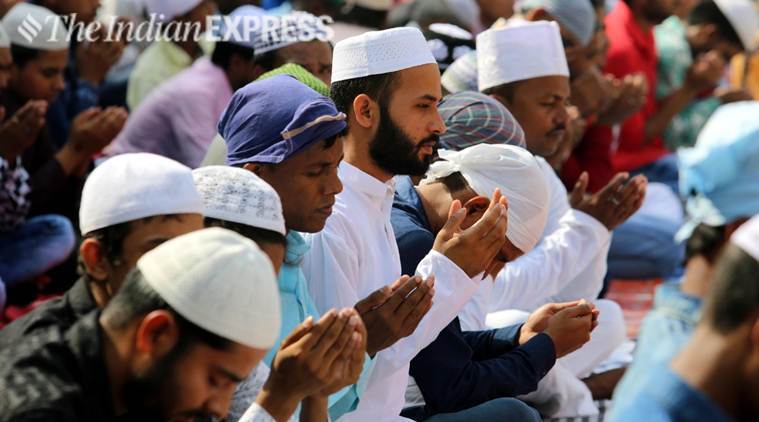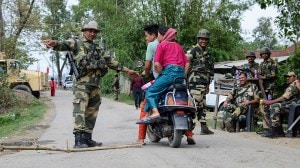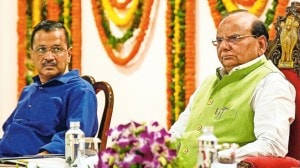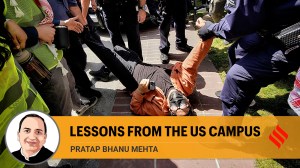- India
- International
View from the right: Minority burden
Another article blames a section of the minority community for the problem and states that “uncontrolled and unbalanced population growth, especially by a section of minority community actively supported by the unprecedented rise of fundamentalist Islamic ideology, is fueling the problem of exponential population growth”.
 Another article blames a section of the minority community for the population problem (File/ Express Photo by Gurmeet Singh)
Another article blames a section of the minority community for the population problem (File/ Express Photo by Gurmeet Singh)
Organiser this week has put the issue of the country’s ever-burgeoning population on its cover. The package has multiple pieces on the topic. The lead article titled ‘Perform or perish’ says that while talking about “Bharat being the nation of youth, the multifaceted problem of population explosion cannot be neglected”.
It argues for a National Population Policy to tackle the problem, which strains “natural resources, addressing claims and aspirations though democratic means, illegal migration, environmental concerns, imbalanced growth, etc”. The article discusses several population control methods, including access to contraceptives. It says that “enormous population is the biggest challenge” and the lack of “development implies high poverty, illiteracy, discrimination, lack of awareness, lock of medical facilities and this in turn increased population growth”.
It also says that “child labour, slave trading and human trafficking is highly prevalent”. It adds that “people give birth to kids and sell them to rich people who in turn employ these kids in various laborious and unethical tasks”. If family planning and use of contraceptives is not made mandatory, the article says, “not much result can be achieved”.
Another article blames a section of the minority community for the problem and states that “uncontrolled and unbalanced population growth, especially by a section of minority community actively supported by the unprecedented rise of fundamentalist Islamic ideology, is fueling the problem of exponential population growth”.
Titled ‘Out of Proportion’, the article says that across the world the highest rate of population growth between 2010 and 2018 was in “three Islamic countries” — Nigeria, Pakistan and Indonesia. “Conclusion can be easily drawn from the figures by the United Nations that the Islamic countries are making the least efforts to control population rise,” it says.

The “exponential rise of Muslims in Bharat too resembles with the world over the trend of the status f Muslims which is influenced by manipulated postulates of Quran and Wahhabi culture”. The “political implications” of this “disproportionate population” increase of Muslims and “their communal agenda in Bharat are very long lasting and alarming since owing to unequivocal tolerance and soft, kind-hearted attitude of Hindus,” the article says.
It cautions that wherever the Muslims are over 20 per cent of the population “if they consolidated there in support of one Muslims candidate no Hindu candidate can win” and claims that there are 101 such seats in the Lok Sabha.
UN’s hypocrisy
The editor of Organiser writes in a signed editorial in this week’s issue about the recently released report by the Office of the United Nations High Commissioner for Human Rights (OHCHR) on the situation of human rights in “Indian-administered Kashmir and Pakistan-administered Kashmir”. He says that the report “is a bunch of contradiction mocking human rights on every count”.
He calls into question the human rights record of some of the members of the organisation. The report, the editorial states mentions 19 recommendations to India and just 10 to Pakistan, none of those 10, it says, “talks about either dismantling the terror infrastructure or human rights violations that takes place because of Pakistan’s terror promotion policy” and asks, “what can be bigger hypocrisy than this?”
The editorial mentions that the Union Ministry of External Affairs “thrashed the report in the harshest possible words” and the response also “reiterated the rightful legal position of Bharat claiming” that all of Kashmir is an integral part of India. It ends by saying that “unless we explore this possibility of internationalising Bhartiya narrative, which is just, truthful and legal, with all possible force and resources, the arsenal of ‘human rights’ will be used to target Bharat by perpetrators of terror”.
Ideology opposing RSS
The opposition to the RSS, starting from it being banned after the murder of Mahatma Gandhi to Congress leader Rahul Gandhi blaming its ideology for the Mahatma’s killing, is what Panchajanya focuses on in its latest editorial. What has prompted the discussion, the editorial mentions, is that some people are “flustered” because a university in Nagpur has decided to introduce a course on the RSS for third-year BA students.
Those opposing it, the magazine says, “are the same people who keep firing sorties at the RSS” and says that “it is important to try and find the essence behind this noise”.
It goes back to Jawaharlal Nehru and says that though the Supreme Court had given the RSS a clean chit in the case of Mahatma Gandhi’s murder, yet the first prime minister of the country wanted to connect VD Savarkar to it and also wanted the RSS banned. This is because, says Panchajanya, Nehru view was through the lens of communism, which blocked the spirit of India.
It adds that the same thought process exists even today and mentions West Bengal Chief Minister Mamata Banerjee.
EXPRESS OPINION
More Explained
Apr 27: Latest News
- 01
- 02
- 03
- 04
- 05











































